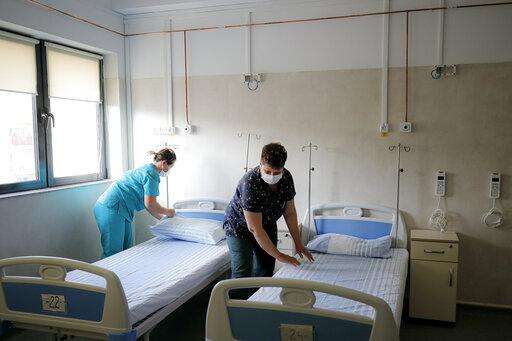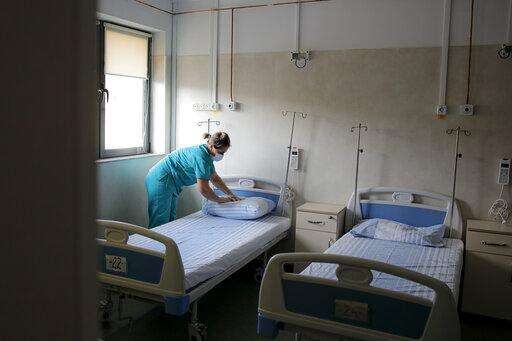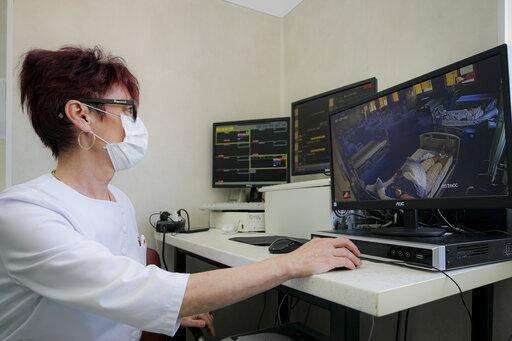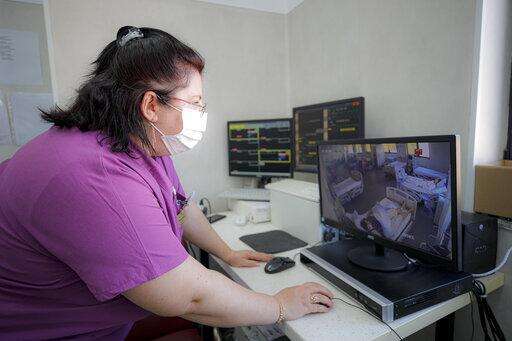Andrei, a 32-year-old Romanian man who has been HIV-positive since he was a baby and began missing his regular medical check-ups when the coronavirus pandemic hit the country, speaks during an interview with the Associated Press in Bucharest, Romania, Thursday, Feb. 25, 2021. A year ago, Romania reported its first case of COVID-19, prompting the country's strapped medical system to turn its focus to treating COVID-19 patients. As a result, many patients with other conditions - including HIV but also cancer and other illnesses - have either been denied critical care or stopped going to their regular appointments, fearful of becoming infected.(AP Photo/Vadim Ghirda)
The Associated Press
BUCHAREST, Romania (AP) - Andrei, a 32-year-old Romanian man who has been HIV positive since he was a baby, began missing his regular medical check-ups when the coronavirus pandemic hit a year ago.
'œThat was the first thing that led me to a general state of frustration and fear,'ť said Andrei. 'œAfter that, I got used to the idea of taking the antiretroviral treatment blindly without knowing if the parameters are OK or if the therapy works.'ť
A year ago this week, Romania reported its first case of COVID-19, prompting the country's strapped medical system to turn its focus to treating COVID-19 patients. As a result, many patients with other conditions - including cancer - have either been denied critical care or have stopped going to their regular appointments, fearful of becoming infected.
'œMany of my close associates lost their battle against their diseases due to the loss of access to treatment, hospitals and specialists,'ť Andrei, who didn't want his full name used due to the stigma surrounding his condition, told The Associated Press.
Romania's government is acknowledging the problem and has announced plans to reorganize the country's hospitals so more non-COVID-19 patients can get access to health care.
The attempts to reform the health care system come as a third virus surge looms and as a vaccine rollout is proceeding slowly across the 27-member European Union, to which Romania belongs.
'œPatients who didn't have COVID-19 didn't seek medical care because they were afraid of becoming infected,'ť Dr. Andreea Moldovan, a state secretary in the Health Ministry, told the AP.
Previously, she said, there was 'œa lot of pressure to have as many beds available for COVID-19 patients as possible."
With a population of over 19 million, Romania has reported 792,000 COVID-19 infections and over 20,000 deaths.
Romania's Health Ministry says its hospital reorganization scheme will aim to create separate red and green zones in hospitals so both non-COVID-19 patients and those infected with the disease can be segregated yet receive the medical care they require.
In an interview at Bucharest's Colentina Hospital, interim hospital manager Victor Cauni said health care services in the long term must adapt to life with COVID-19 and not 'œdiscriminate'ť against other patients.
'œWhether we like it or not, we have more patients with many other illnesses compared to COVID patients," he said. 'œWe need to open for them at least partially. We're discriminating against patients with serious conditions.'ť
Highlighting the problem, Cauni noted that the hospital's urological ward used to perform from 400 to 500 medical interventions a month, but has barely had 50 in the past year.
'œFor the last year, patients did not have access to this hospital, and they were supposed to be transferred to different hospitals - but not many managed to find the required solutions,'ť Cauni said.
'œYou cannot just function as a COVID-19 hospital," he said. 'œWe have many important wards here.'ť
The organizational changes in Romania's hospitals come amid growing concerns about new virus variants, including the variant first found in the U.K., which scientists say is both more transmissible and more deadly.
Romania faces these challenges as the EU nation with the lowest health care spending relative to GDP - 5.2%, compared with almost 10% on average in the bloc.
Romania already has the highest rate of avoidable deaths of under-75s in the EU, according to EU statistics.
Health Minister Vlad Voiculescu expressed his concerns in a video address last week to hospital managers and public health officials, explaining the hospital reorganization effort.
'œThe pandemic has not wiped out all other chronic or acute health problems,'ť Voiculescu said. 'œWe need to make sure that all other patients have access to the medical services they need."
Andrei, who became infected with HIV as a baby while being treated in a hospital, says he considers himself 'œone of the lucky ones."
He has managed to pay privately for a few medical analyses in the past year. But he worries about his longer-term prospects if he doesn't return to the close monitoring of his illness.
'œThe situation is critical,'ť he said. 'œIf I keep blindly taking my treatment without proper monthly visits and analyses to check if the treatment is working '¦ there is only one outcome - the loss of life.'ť
___
- Follow all of AP's pandemic coverage at https://apnews.com/hub/coronavirus-pandemic, https://apnews.com/hub/coronavirus-vaccine and https://apnews.com/UnderstandingtheOutbreak
Medical staff check an empty ward, reserved for possible COVID-19 patients, at the Colentina Hospital in Bucharest, Romania, Thursday, Feb. 25, 2021. A year ago, Romania reported its first case of COVID-19, prompting the country's strapped medical system to turn its focus to treating COVID-19 patients. As a result, many patients with other conditions - including HIV but also cancer and other illnesses - have either been denied critical care or stopped going to their regular appointments, fearful of becoming infected.(AP Photo/Vadim Ghirda)
The Associated Press

Medical staff check an empty ward, reserved for possible COVID-19 patients, at the Colentina Hospital in Bucharest, Romania, Thursday, Feb. 25, 2021. A year ago, Romania reported its first case of COVID-19, prompting the country's strapped medical system to turn its focus to treating COVID-19 patients. As a result, many patients with other conditions - including HIV but also cancer and other illnesses - have either been denied critical care or stopped going to their regular appointments, fearful of becoming infected.(AP Photo/Vadim Ghirda)
The Associated Press

Medical staff check an empty ward, reserved for possible COVID-19 patients, at the Colentina Hospital in Bucharest, Romania, Thursday, Feb. 25, 2021. A year ago, Romania reported its first case of COVID-19, prompting the country's strapped medical system to turn its focus to treating COVID-19 patients. As a result, many patients with other conditions - including HIV but also cancer and other illnesses - have either been denied critical care or stopped going to their regular appointments, fearful of becoming infected.(AP Photo/Vadim Ghirda)
The Associated Press

Medical staff check an empty ward, reserved for possible COVID-19 patients, at the Colentina Hospital in Bucharest, Romania, Thursday, Feb. 25, 2021. A year ago, Romania reported its first case of COVID-19, prompting the country's strapped medical system to turn its focus to treating COVID-19 patients. As a result, many patients with other conditions - including HIV but also cancer and other illnesses - have either been denied critical care or stopped going to their regular appointments, fearful of becoming infected.(AP Photo/Vadim Ghirda)
The Associated Press

Medical staff monitor COVID-19 patients, at the Colentina Hospital in Bucharest, Romania, Thursday, Feb. 25, 2021. A year ago, Romania reported its first case of COVID-19, prompting the country's strapped medical system to turn its focus to treating COVID-19 patients. As a result, many patients with other conditions - including HIV but also cancer and other illnesses - have either been denied critical care or stopped going to their regular appointments, fearful of becoming infected.(AP Photo/Vadim Ghirda)
The Associated Press

Medical staff monitor COVID-19 patients, at the Colentina Hospital in Bucharest, Romania, Thursday, Feb. 25, 2021. A year ago, Romania reported its first case of COVID-19, prompting the country's strapped medical system to turn its focus to treating COVID-19 patients. As a result, many patients with other conditions - including HIV but also cancer and other illnesses - have either been denied critical care or stopped going to their regular appointments, fearful of becoming infected.(AP Photo/Vadim Ghirda)
The Associated Press

Andrei, a 32-year-old Romanian man who has been HIV-positive since he was a baby and began missing his regular medical check-ups when the coronavirus pandemic hit the country, speaks during an interview with the Associated Press in Bucharest, Romania, Thursday, Feb. 25, 2021. A year ago, Romania reported its first case of COVID-19, prompting the country's strapped medical system to turn its focus to treating COVID-19 patients. As a result, many patients with other conditions - including HIV but also cancer and other illnesses - have either been denied critical care or stopped going to their regular appointments, fearful of becoming infected.(AP Photo/Vadim Ghirda)
The Associated Press